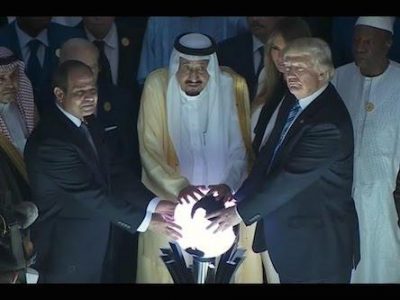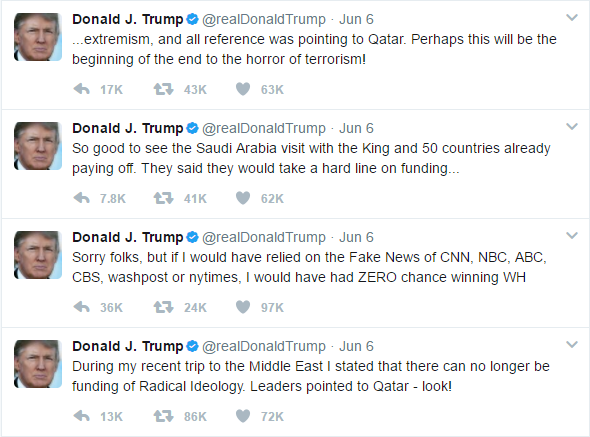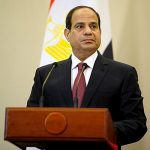Dumb Donald Thinks He’s Pulled the Plug on ISIS and Al-Qaida (and the CIA?)

“Without the jihadists, the U.S. would have to resort to massive deployment of its own troops to the region — a mission that the American people will not accept.”
The international Islamic jihadist network, created nearly four decades ago in Afghanistan by the United States, Saudi Arabia and Pakistan, is unraveling in full view of a planetary audience. Donald Trump thinks it’s all his doing — but he’s wrong, of course.
The Kingdom of Saudi Arabia has rallied most of the Gulf Cooperative Council to isolate — and possibly overthrow — the emir of neighboring Qatar, the world’s third largest natural gas producer. The dispute between Qatar and the House of Saud — the two main funders of al Qaida and its spawn, the Islamic State — is rooted in rivalries beyond the mental grasp of the idiot in the White House, but Trump nevertheless takes full credit.
“During my recent trip to the Middle East I stated that there can no longer be funding of Radical Ideology,” Trump tweeted. “Leaders pointed to Qatar — look!”
Trump appears to actually believe that the Saudis — the godfathers, along with U.S., of international jihadism –- have renounced their bankrolling of Islamist holy wars.
“So good to see the Saudi Arabia visit with the King and 50 countries already paying off,” tweeted Trump. “They said they would take a hard line on funding. Perhaps this will be the beginning of the end to the horror of terrorism!”
Screenshot from Donald Trump’s Twitter Account
“The dispute between Qatar and the House of Saud is rooted in rivalries beyond the mental grasp of the idiot in the White House.”
The Saudis are blaming their fellow Wahhabist, the Emir of Qatar, for “adopting various terrorist and sectarian groups aimed at destabilizing the region including the Muslim Brotherhood Group, Daesh (ISIS) and Al-Qaeda, promoting the ethics and plans of these groups through its media…supporting the activities of Iranian-backed terrorist groups in the governorate of Qatif of the Kingdom of Saudi Arabia and the Kingdom of Bahrain, financing, adopting and sheltering extremists who seek to undermine the stability and unity of the homeland at home and abroad, and using the media that seek to fuel the strife internally….”
In addition to shutting off trade, travel and diplomatic relations with Qatar, a tiny peninsula jutting out from the Persian Gulf side of Saudi Arabia, the House of Saud has excommunicated Qatar’s emir from the Wahhabist fold — a heavy sanction among hereditary rulers whose legitimacy is bound up in their relationship to The Faith. However, the key point of the Saudi indictment involves Qatar’s support for the Muslim Brotherhood.
The Saudi royal family opposes all forms of political Islam as a threat to its own legitimacy as Protector of the Two Holy Cities, Mecca and Medina. Since its final conquest of most of the Arabian peninsula in the early 20th century, and in subsequent alliance with British imperialism, the House of Saud has ruled with the assent of the Wahhabi clerical class. It is a delicate arrangement, in which the hereditary royals are allowed control of the state and national resources in return for the Saudi state’s support of the clerics’ ultra-fundamentalist Wahhabi ideology, which sanctions the killing of Muslims deemed heretics and “idolators,” mainly Shia. The House of Saud views the Muslim Brotherhood, the godfather of modern political Islam, as a challenge to the legitimacy absolute royal rule. The Brotherhood has influenced the widest range of Islamist political tendencies, from bourgeois electoral party politics to advocacy of a unified, Muslim-wide caliphate. But Saudi Arabia does not tolerate political pluralism, and royal rule is ultimately antithetical to a caliphate. And therein lies the political-theological contradiction.
“The hereditary royals are allowed control of the state and national resources in return for the Saudi state’s support of the clerics’ ultra-fundamentalist Wahhabi ideology.”
The House of Saud has trod a perilous path to maintain its family’s monopoly on the riches beneath its soil. (Actually, most of the oil lies in land populated by the Kingdom’s Shia minority.) The deal requires the Saudi state to provide massive support for the export of the clerical class’s Wahhabist ideology to the far reaches of the Muslim world, yet it holds temporal power firmly in the hands of the princes, not the clerics.
The other pillar of royal rule is western imperialism. The Brits, and then the Americans, partnered with the House of Saud as a bulwark against secular nationalism in the Arab and Muslim world. It was only logical that the Saudis would ally with the American CIA to create the world’s first international jihadist network to overthrow a secular leftist government in Afghanistan in the late 1970s, thus bringing forth al Qaida and its many offspring.
The royal family of Qatar, with a citizen population of only 200,000 (the rest of the 2 million inhabitants are non-citizens, mostly low-wage workers, a plurality from India), is also nominally Wahhabist. But they chose a different path to political legitimacy — while also becoming exporters of jihadist terror. The tiny state’s emirs tried to establish a pan-Arab and pan-Muslim political presence commensurate with their wealth — the highest per capita in the world — through an aggressive strategy including generous support for the Muslim Brotherhood. Qatar gave billions to the short-lived government of Egyptian president Mohamed Morsi, before he was overthrown by the military in 2013. (The Saudis then funneled billions to his jailer, General Abdel Fattah el-Sisi who, predictably, has joined in the isolation of Qatar.)
“They wishfully believe that by exporting terror, they insulate themselves from jihadist wrath.”
The emirs garnered considerable global prestige through their news and analysis outlet, but Al-Jazeera was often a source of irritation to the Saudi, Kuwaiti and Emirati royals, as well as western imperialists. Al-Jazeera was accused of blatantly favoring the Muslim Brotherhood government in Egypt, and kicked out of the country. The next year, Saudi Arabia and other Gulf states severed relations with Qatar for eight months, as punishment.
Despite their differences, Qatar, Saudi Arabia and the United Arab Emirates are all partners with the U.S. in the proxy, terror war against Syria. It’s a matter of self-preservation. As hereditary regimes, they reject democracy of any flavor. As clients of western imperialism, they oppose Arab nationalism and are ultimately subservient to Washington. They are allied with the most reactionary elements of the clergy, who demand support for Islamist war. And, they wishfully believe that by exporting terror, they insulate themselves from jihadist wrath. But, the weight of contradictions spell doom for all of these autocrats — and looming defeat for the United States.
Donald Trump seems honestly giddy, apparently believing he has forced the Saudis to reject jihadist terror and to punish Qatar for its support of ISIS and al-Qaida. Perhaps he truly does not know that the main actor in the proxy war is not Saudi Arabia, the Emirates, Kuwait, or Qatar –- it is the CIA, the other, and most important, godfather of Islamist jihad. (The CIA is not a friend of Trump, so maybe they are not talking to each other.) The United States has become dependent on al-Qaida and its cousins as foot soldiers of imperialism in southwest Asia. If the fighters are decommissioned, through the denial of arms, money and protection, then the war against Syria is lost, and the U.S. military offensive begun by President Obama in 2011, with the unprovoked attack on Libya, will have ended in defeat. Without the jihadists, the U.S. would have to resort to massive deployment of its own troops to the region — a mission that the American people will not accept.
“The main actor in the proxy war is not Saudi Arabia, the Emirates, Kuwait, or Qatar –- it is the CIA, the other, and most important, godfather of Islamist jihad.”
The Saudi regime, in particular, may not survive an end to the Syria war. During the course of the conflict, the Islamic State faction of al-Qaida crossed a political Rubicon, declaring war on Saudi Arabia in 2014 and proclaiming itself a caliphate. The only ideological difference between the Islamic State and al-Qaida in Syria is that al-Qaida is willing to postpone the establishment of a caliphate, while ISIS is not. Otherwise, the two factions are identical in their political theology. If the jihadists are defeated in Syria — and, especially, if they feel they have been betrayed — they will vent their most intense fury on their co-religionists and former sugar daddies in the Gulf. Al-Qaida will become an ISIS, with no mercy on its former patrons.
So, don’t believe for a second that the Saudis are abandoning ISIS and al-Qaida, or are attempting to force Qatar to do the same. Neither is the CIA, which simply rebrands its jihadists when their names become too notorious.
Does Donald Trump know that the Saudis are blowing smoke in his face? Does he realize that his own CIA and military have no intention of giving up their jihadists, whom they cannot do without? Who knows? Does it really matter? The criminal U.S. war against Syria will unravel from the weight of its own contradictions. In the end, Washington’s Gulf “partners” necks will be on the chopping block.
BAR executive editor Glen Ford can be contacted at [email protected].
Glen Ford’s blog
Featured image: Black Agenda Report




